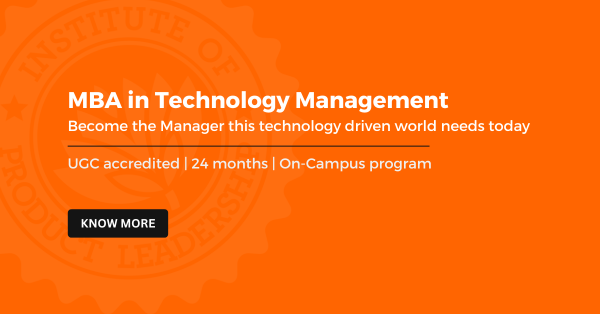The Rise of Technology Management in MBA Programs
- blogs
- 5 min read
By Arnould Joseph– Product Marketing Manager
As businesses increasingly rely on artificial intelligence, digital transformation, and automation, the role of business leaders with deep technological expertise is more critical than ever. Traditional MBA programs have focused on finance, marketing, and operations, but the demand for tech-savvy managers has given rise to a new specialization—MBA in Technology Management.
This shift is not just a trend; it’s a response to industry demands. According to a World Economic Forum report, 50% of all employees will need reskilling in emerging technologies by 2025. As a result, MBA programs are evolving to include data-driven decision-making, AI strategy, and technology leadership.
In this blog, we’ll explore why Technology Management MBAs are becoming the new standard for business education, how they compare to traditional MBAs, and what career opportunities they unlock.
Key Takeaways:
- Businesses need managers skilled in AI, data analytics, and digital transformation to drive growth.
- Top business schools are integrating AI, cloud computing, and real-world tech collaborations into their curriculam.
- Technology Management MBA offers higher salaries and better opportunities in AI-driven industries.
- Graduates can secure roles in AI product management, digital transformation, and tech consulting.
1. Why Businesses Need Tech-Savvy Leaders
In today’s world, business decisions are no longer just about strategy—they are about technology. Companies like Amazon, Google, and Tesla don’t just operate in their industries; they define them through AI, cloud computing, and automation.
According to McKinsey & Company, companies that embrace digital transformation and AI strategy are 23% more profitable than those that don’t. But to leverage this advantage, they need leaders who understand both business and technology—a gap that traditional MBAs struggle to fill.
- Tech-Driven Industries Need Business Leaders: Whether it’s FinTech, HealthTech, or AI-based startups, businesses need leaders who understand how to monetize technology, manage digital products, and implement AI solutions.
- Data is the New Gold: A PwC report suggests that data-driven companies outperform their competitors by 5-6% in productivity and profitability. Business leaders who can translate data insights into business growth will have a significant advantage.
- Cybersecurity & Risk Management: In an era where cyber threats cost businesses over $1 trillion annually, companies are actively seeking leaders who understand risk mitigation in digital ecosystems.
Traditional MBA programs focus on general management, financial models, and market strategies, but they often lack the technological foundation required for success in AI-first, digital-first businesses.
2. The Evolution of MBA Programs
As technology continues to reshape business, MBA programs are evolving in response. The Harvard Business Review notes that over 60% of Fortune 500 companies are investing in leadership programs with a technology focus. Some of the most significant changes in MBA education include:
- Integration of AI & Digital Transformation: Business schools now include courses on AI strategy, blockchain, and cloud computing.
- Tech-Industry Collaboration: Schools are partnering with tech giants like Google, Microsoft, and Amazon to create real-world case studies for students.
- Hybrid Business-Tech Courses: Programs like MBA in Technology Management now combine business leadership, product innovation, and data analytics, making graduates highly valuable.
These changes reflect the growing need for business leaders who can navigate digital transformations.
3. MBA in Technology Management vs. Traditional MBA: Key Differences
| Feature | Traditional MBA | MBA in Technology Management |
|---|---|---|
| Focus | Finance, Marketing, Strategy | AI, Digital Business, Product Leadership |
| Curriculum | Case Studies, Business Theories | AI Strategy, Data Analytics, Digital Transformation |
| Job Roles | General Manager, Consultant | Product Manager, Technology Consultant, AI Strategist |
| Industry Demand | Stable | High Growth in AI-first Companies |
| Salary Potential | ₹15-25 LPA | ₹25-40 LPA |
A traditional MBA prepares you for general management, while an MBA in Technology Management prepares you to lead AI-driven businesses.
4. Career Opportunities After an MBA in Technology Management
Graduates of an MBA in Technology Management can explore high-demand roles in AI-first, tech-driven industries. Some of the top career paths include:
A. Product Management in AI & Tech Companies
- Lead AI-driven product development in companies like Google, Microsoft, and Tesla
- Manage the lifecycle of AI-based applications, cloud platforms, and automation tools
- Average Salary: ₹28-40 LPA
B. Digital Transformation Manager
- Help companies adopt AI, blockchain, and cloud computing
- Work with CXOs to drive technology-driven business strategies
- Average Salary: ₹25-35 LPA
C. Technology Strategy & AI Consultant
- Advise global businesses on AI adoption and tech innovation
- Work with consulting firms like McKinsey, BCG, and Deloitte
- Average Salary: ₹30-45 LPA
According to a LinkedIn Emerging Jobs Report, AI Product Management and Digital Transformation roles are among the fastest-growing job categories in the world.
5. Is an MBA in Technology Management Right for You?
If you’re looking to future-proof your career, transition into leadership roles, or work at the intersection of business and technology, this specialized MBA could be the best choice.
- Do you want to lead AI-driven businesses?
- Are you interested in digital product management?
- Do you want to work in a high-growth, future-ready industry?
If your answer is YES, then an MBA in Technology Management can position you for success in AI-first, technology-driven businesses.
The Future of MBA Programs is Tech-Driven
As industries evolve, business education must keep pace with technological advancements. Traditional MBA programs, while valuable, do not fully prepare graduates for AI, automation, and digital transformation.
An MBA in Technology Management bridges this gap, making graduates highly sought after by top global employers. Whether you’re a mid-career professional looking to upskill or an early-career professional aiming for leadership, this MBA specialization could be your gateway to success.
Would you choose a traditional MBA or one that prepares you for the AI-first world?
About the Author:
Arnould Joseph– Product Marketing Manager






